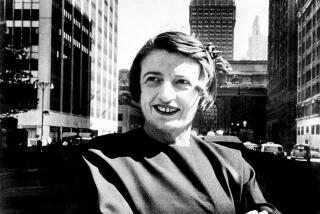Movie review: ‘Atlas Shrugged’
- Share via
The tinhorn film version of “Atlas Shrugged” fails to rise even to the level of “eh” suggested by Ayn Rand’s title. But with so little going on in cinematic or storytelling terms, we can cut straight to the fascinating tea-stained politics of the thing.
Conceived as the first of a proposed three-part series, director Paul Johansson’s movie is the work of true believers in Rand’s pet theory known as Objectivism, which can be described as “Us? There is no ‘us’!” In Rand’s worldview, it is me-time, all the time. The capitalistic visionaries among us have been hounded and taxed and ground down so relentlessly by the federal government and other societal evils, there’s nothing to do but blow the whole thing up and start anew, in a civilization run by the mysterious John Galt, who respects the rapacious dog-eat-dog nature of humankind and the sexy, life-enhancing virtues of unfettered economic competition.
Published in 1957, Rand’s novel has been championed over the decades by such noteworthy governmental and media figureheads as Alan Greenspan, Rush Limbaugh and Glenn Beck, and the loosely defined “tea party” millions currently exercising considerable influence in American politics will find much in Rand’s story to stoke their righteous wrath. As adapted, dutifully if flatly, by screenwriters Brian Patrick O’Toole and John Aglialoro, the movie deploys Rand’s code words and phrases like little bombs. Each time one of Rand’s noble warriors — industrialists, inventors, plus a craven lobbyist or federal-payroll slacker for moral contrast — mutters something about “federal tax” or “public funding” or the uselessness of altruism, it’s like a call to arms.
There is a woman at the zinc-like heart of it all, the railroad company magnate Dagny Taggart (Taylor Schilling, bland as water). She becomes one with the mighty steel company genius Henry Rearden (Grant Bowler, no less watery). As adapted here, Rand’s dialogue is full of come-ons such as: “Dagny, what we’re doing — my metal, your railway…”
Rand set her version of events simultaneously in the robber-baron past and the science-fiction future.
The movie plunks the tale down in an oil-strapped 2016. This world is delivered visually with zero atmosphere or sense of energy. Without any melodramatic zing in its corner, when Rearden greets his “depraved playboy” nemesis and sexual rival with “Your reputation precedes you, Señor d’Anconia,” the line, like so many others, dies a tragic little death.
At least with the 1949 version of “The Fountainhead,” you had the sense of actors clawing their way through Rand’s philosophy toward a human feeling or two. Director King Vidor certainly held up his end; the Expressionist zap and noir-inflected imagery in “The Fountainhead” is peerlessly bizarre. Not here. This movie is crushingly ordinary in every way, which with Rand, I wouldn’t have thought possible.
More to Read
The biggest entertainment stories
Get our big stories about Hollywood, film, television, music, arts, culture and more right in your inbox as soon as they publish.
You may occasionally receive promotional content from the Los Angeles Times.










